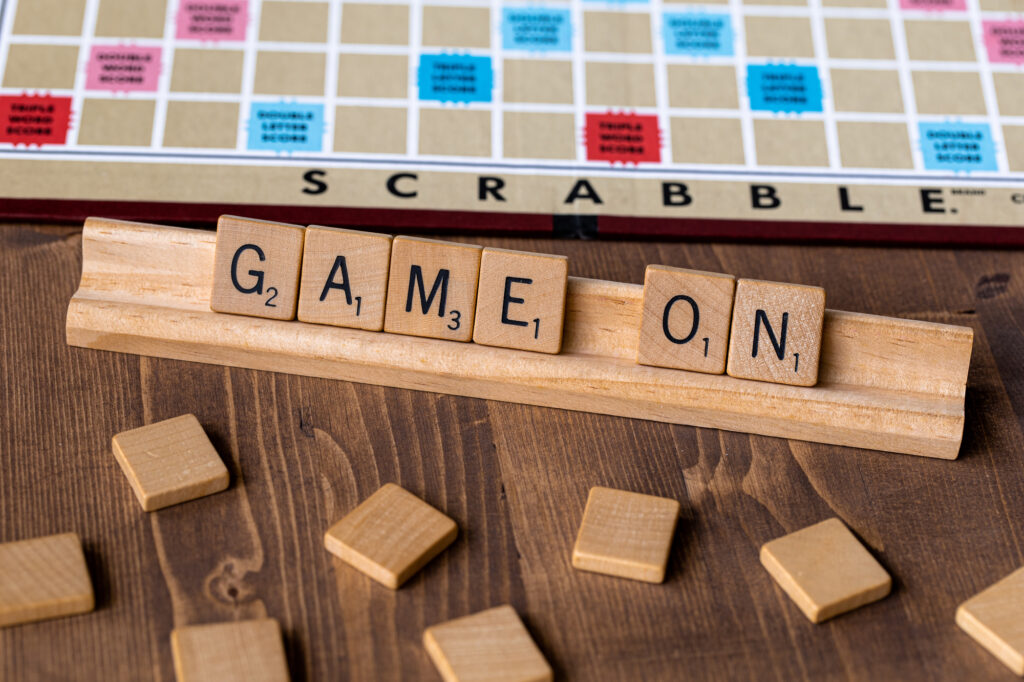Family Game Night is More Than Just Fun and Games

Family game night is a great way to bring the family together for some quality time and of course, fun! There are many benefits of playing games together. Probably the best benefit is to allow you to spend time with each other and bond in ways that are both entertaining and meaningful.
Playing games as a family can be an opportunity for everyone to learn valuable skills like communication, teamwork, problem-solving, and even leadership. Not only do these activities provide entertainment, but they also help build stronger relationships between members of a family or friend group.

Games at our house usually means togetherness. However, family game night for us can mean fierce competition at times also. Here’s one
instance where we had just the opposite of “togetherness.”
Our family loves the game of Spoons! We will fight tooth and nail to grab that last spoon, because no one wants to accumulate letters. On one occasion, my son came across the table to grab the last spoon that had flipped up in the air. He dove so hard across the table, that when he landed. . .that table broke right in half! Our table had no more “togetherness” after that night. Ha ha!

Now, I don’t recommend that you go to such extremes when you play, but a little competition makes things more exciting to be sure. Let’s explore some of the greatest benefits of playing games together. This is not an exhaustive list of the benefits but it’s some of our favorites.
Table of Contents
Spend Quality Time Together
Although this section is devoted to being together as family members, it can all apply to being with friends also. So, anywhere you see “family” referenced in this article, feel free to substitute “friends.”
Playing games as a family can afford you some special time together. For starters, playing games can help strengthen your relationships (which we’ll talk about in the next section). It’s an easy way to spend quality time together and talk while having fun. To make the most of it, try to make your time together distraction free. Let’s talk about what that might look like.
Phones and Other Screens
By far, the biggest distraction
these days seems to be our phones! Make sure that family members aren’t staring
at their screens in between turns. You may want to try this as an alternative.
Have a basket of treats near the door when people arrive. Have everyone turn
off their notifications, deposit their phone into the basket, and take out a
treat to enjoy. This will at least eliminate a major distraction for the night.
At the end of the evening, they can retrieve their phones before they leave.

At first, not having their phone with them may cause anxiety for most people. However, as they put their phone down more and more, they’ll get used to the idea that the world won’t stop spinning and they’ll be more present with those in the room.
Unless you have an on-call doctor in the house, most family members will not die if they don’t have their phone by their side. (Although, most teenagers might feel like they will. Ha ha!)
There may be a couple of exceptions to consider. One is that a parent may have left their children at home with a babysitter and want their phone to keep in contact. Simply have them keep their ringer on but silence other notifications. Also, one person may want to use their phone to take advantage of some of the specific score-keeping apps available, because there are some great ones out there.
Television
Don’t have the television on during game night unless you’re playing a game that uses video. If you are playing that type of game, have the TV’s input already set to the video setting needed so the TV doesn’t get turned on and people immediately are distracted by their favorite series, game show, or commercial. Yes. . .it happens!

Young Children
If game night means that the younger ones in the group are going to be doing a different activity or playing a different game than the older kids and adults, make sure they are set up with everything they need ahead of time. This includes making sure they know the rules of what they are playing, have all the components of their activity, and that they understand that they need to wait until there is a break in your game to come to you with a question or request.
Above all, charge them with trying to resolve conflicts on their own before involving an adult. This is a great skill for kids to learn early in life. There are definitely benefits of playing games for even the youngest in your group.
One of the most common requests from the kids while we’re playing is often food or drink related. To solve this, you could set up a small station of snacks and drinks that sits within their reach. Give them instructions such as how much they can have or where they can eat or drink their snacks. This has solved many interruptions for the adults of “Mommy, can you get me a drink?” right in the middle of an intense round of a game
Other Distractions
Assess any other distractions or interruptions that you can anticipate. Try to get ahead of what they may be and create a solution before the need arises.
Strengthen Relationships
The world we live in doesn’t give us much opportunity to spend that quality time together. There are so many demands on our time and attention. Setting aside time to play together is an important part of strengthening relationships with family members and friends. I love the saying that “all work and no play makes Jack a dull boy.” It’s true. Yes, we need to work together in family settings, but we need to laugh and play together as well.
Some of my fondest memories are of playing games with family and friends as a child or young adult. It was during those carefree conversations that were had around the table where I learned a lot about the people I was with. When people are relaxed and not feeling the strain of everyday pressures, they tend to open up more and their conversations are relaxed and not so focused on the stress of the day.
A real bonus around our game table has been the sharing of memories. My adult children love to reminisce about when they were younger. We often talk about the good times, the funny times, and share memories about friends and family that sometimes we had forgotten about.

Working Together
As a family, we work together. Yes, when you live with
others, there is always a lot of work to do, but this kind of working together
is different. Learning to work together to accomplish a common goal when you’re
playing takes a different skill set than cleaning up the house.
Learning to cooperate in teams is a special skill that may
be seriously lacking in our world today. Many people are in survival mode with
all the pressures that today’s world puts on us. Some days it’s every man for
himself. However, playing games together can create opportunities to think of
others and use the skills of others as we work towards a common goal.
Develop Education Skills and Life Lessons
One of the biggest benefits of playing games is education. There are so many skills that can be developed while having fun. Certainly, kids (and some adults) don’t want to acknowledge that they are learning anything, but through the process of play, it sneaks its way in. Here’s my little round-up of life skills that will benefit anyone at any age.
Problem-solving
Almost any game you play has a
degree of needing to work through to a conclusion of some sort. Whether it’s
which path to take, whether or not to risk your position, or simply weighing
out your options, most games have a level of problem solving that needs to be
done to get to the end of the game.
Cooperation
Many games have team play which involves
communication and cooperation to win. You’ve probably seen a team arguing or
not cooperating fall apart and lose a game – not because the players weren’t
good enough to win, but because of a lack of clarity about their objective and
a refusal to put their selfish instincts aside. On the other hand, you’ve
probably also seen the reverse of this. This is a life lesson that can be used
in school, business, families, and social situations. Cooperation often means
that you must think of others before yourself. Great skill to possess!
Following Rules
Often, following rules seems to be
a burden and even unpleasant. However, most rules are in place for safety and
to keep order. If we had no rules in life, there would be chaos! Following and
keeping the rules is part of life, and playing games helps us learn that rules
have their place in our world. Now, if a rule seems to be unjust or unfair,
working together to change that rule is perfectly acceptable…another great
skill to learn.

Math Skills
It’s pretty obvious that many games have math skills involved. Simply rolling dice is a great way to learn to add up small numbers quickly. Keeping score usually involves some level of addition and subtraction making it a great way for kids to learn to do this without calculators. Some of the other more hidden math skills are deductive reasoning, estimating, and averaging. The beauty of this is that it is part of playing and not sitting at a desk.
Strategy
Learning strategy for all kinds of situations is one of my favorite life and educational benefits of playing games. Most games you play require you to develop some type of strategy to win. Decision making is a large part of strategy. Without being conscious of it, you are developing and exercising your decision-making muscles. Learning and implementing strategy also requires critical thinking skills.
So, without much thought, learning life skills comes with the territory. . .all while you’re having fun!
Relaxation and Laughter
Life is full of stress and decompressing from our busy, deadline-driven lives is a must. Playing, social interactions, relaxing, laughing, and taking time out to be present with family and friends are all great benefits of playing games together. Don’t underestimate the power of just kicking back and enjoying yourself. Most of us work hard during the week. A weekend night of food, friendship, and fun can be a healthy outlet to shake off the stress of a busy week behind you.

Creating Memories
When you’re having fun, there’s no doubt you will create wonderful memories with family and friends as you play and laugh together. The traditions that we built in our family have been the anchor of our kids’ adult lives. Like I said above, they love to reminisce about fun things that they remember as a child. Game nights are one of the highlights that they often reference. The table-breaking incident that I mentioned earlier is probably the most memorable game night in our history!
Another of the great memories are the game nights that we had when we went camping with our friends. Those warm summer nights playing at a picnic table, using only a lantern’s light, swatting at mosquitoes, without any technology to distract us, were some of the best times my kids can recall.
What memories will you create with your family and friends?

Conclusion
Home is where the heart is, and family game night is a great way to bring people together. It’s an easy way to spend quality time with each other while having fun and learning something new. With games for all ages and skill levels, you can help build strong bonds, teach problem-solving skills, and encourage cooperation – making it a beneficial activity for everyone.

So why not make it a regular tradition in your home and discover the many benefits of playing games? Get creative and find something for everyone – you never know, you might even find a new favorite game! Have fun and enjoy the many joys of a fun family game night.
